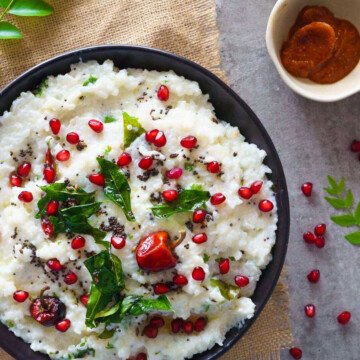
Curd Rice Recipe
Curd Rice is a soothing Indian dish made by mixing cooked rice with yogurt, seasoned with mustard seeds, curry leaves, and green chilies. It’s a cooling side dish, perfect for hot days or paired with spicy meals. Nutritious and easy to prepare, it offers probiotics from yogurt and carbohydrates from rice.
Ingredients
- 1 Cup Basmati or any long-grain rice
- 2 Cup Plain curd (yogurt)
- 1 tablespoon Oil
- 1 teaspoon Mustard seeds
- 1 teaspoon Cumin seeds
- ½ teaspoon Urad dal (split black gram)
- ½ teaspoon Chana dal (split chickpeas)
- 2-3 Green chilies, finely chopped
- 1 tablespoon Ginger, finely chopped
- A few curry leaves
- ¼ teaspoon Turmeric powder
- ½ teaspoon Asafoetida (hing)
- Salt to taste
- Fresh coriander leaves for garnish
- 1 tablespoon Chopped cilantro (optional)
Instructions
Cook the Rice
- First, rinse 1 cup of rice under cold water until the water runs clear. This helps remove extra starch and keeps the rice fluffy.
- Next, in a medium saucepan, add 2 cups of water and a pinch of salt. Bring it to a boil.
- Then, add the rinsed rice to the boiling water. Reduce the heat to low, cover the pot, and cook for about 10-12 minutes, or until the rice is soft and all the water is absorbed.
- Finally, remove the pot from heat and let the rice cool to room temperature.
Prepare the Tempering
- In a small pan, heat 1 tablespoon of oil over medium heat. Once hot, add 1 teaspoon of mustard seeds and let them splutter.
- Then, add 1 teaspoon of cumin seeds, ½ teaspoon of urad dal, and ½ teaspoon of chana dal. Sauté for a minute until they turn golden brown.
- Next, add finely chopped green chilies, ginger, and a few curry leaves. Sauté for another minute to bring out the flavors.
- Finally, add ¼ teaspoon of turmeric powder and ½ teaspoon of asafoetida. Stir well for a few seconds to mix everything together.
Combine and Serve
- In a large bowl, combine the cooled rice with 2 cups of plain curd (yogurt).
- Then, mix in the prepared tempering and adjust the salt to taste.
- For the finishing touch, garnish with fresh coriander leaves and chopped cilantro for extra flavor.
- You can serve it immediately, or chill it in the fridge for a cool and refreshing treat!
Notes
Creative Variations: Give Your Curd Rice a Unique Twist!
-
- Spicy Curd Rice: Want a little heat? Add green chilies, ginger, or black pepper to the tempering for a mild spicy kick. It’ll definitely wake up your taste buds!
-
- Vegetable Curd Rice: To add extra crunch and nutrition, mix in boiled veggies like carrots, peas, or cucumber. Not only do they boost the health factor, but they also make the rice more colorful and fun! Plus, the veggies give each bite a satisfying texture, making your curd rice even more delicious!
-
- Herbed Curd Rice: If you like fresh flavors, stir in mint or cilantro. These herbs will give your rice a refreshing twist—perfect for summer!
-
- Lemon Curd Rice: For a tangy surprise, squeeze in some lemon or lime juice instead of the usual spices. It adds a zesty burst that’s super refreshing!
-
- Curd Rice with Fruits: Try adding fruits like pomegranate, grapes, or pineapple for a sweet and savory combo that’s unexpected but delicious!
-
- Curd Rice with Pickles: For an extra burst of flavor, pair your curd rice with spicy mango or lime pickle. The tangy and spicy contrast creates a mouthwatering combination that will make each bite even more exciting!
Tips and Tricks for Perfect Curd Rice!
Texture Matters: The ideal curd rice should be creamy and smooth. If it’s too thick, just add a splash of milk or water to loosen it up. This makes it super easy to mix and eat! Perfect Yogurt Consistency: Always use thick yogurt! If your curd is too thin, it can make the rice watery. If needed, strain it to remove any extra water. This keeps your rice nice and creamy! Don’t Overheat the Rice: Remember, when mixing yogurt, the rice should be warm, not hot! Too hot rice can make the curd curdle, and we definitely don’t want that. Let it cool down a little before adding the curd. Customize the Spices: You can play around with the spices! If you like your curd rice mild, use less mustard seeds and green chilies. But if you love spice, feel free to add more! Customize to your taste.Nutrition
Nutrition Facts
Curd Rice Recipe
Amount per Serving
Calories
1200
% Daily Value*
Fat
35
g
54
%
Saturated Fat
7
g
44
%
Polyunsaturated Fat
7
g
Monounsaturated Fat
20
g
Cholesterol
10
mg
3
%
Sodium
600
mg
26
%
Potassium
800
mg
23
%
Carbohydrates
160
g
53
%
Fiber
8
g
33
%
Sugar
8
g
9
%
Protein
30
g
60
%
Vitamin A
400
IU
8
%
Vitamin B1
0.3
mg
20
%
Vitamin B2
0.5
mg
29
%
Vitamin B3
6
mg
30
%
Vitamin B5
1
mg
10
%
Vitamin B6
0.5
mg
25
%
Vitamin B12
2
µg
33
%
Vitamin C
8
mg
10
%
Vitamin E
1
mg
7
%
Vitamin K
15
µg
14
%
Calcium
400
mg
40
%
Iron
4
mg
22
%
* Percent Daily Values are based on a 2000 calorie diet.
Tried this recipe?Let us know how it was!